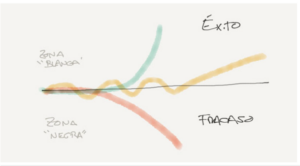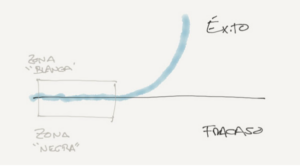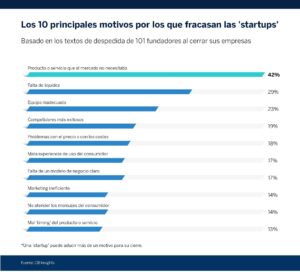TYPICAL CAUSES OF FAILURE
Accelerate your business with these expert tips on "Typical causes of failure". Analyse and discover this TIP!
We learn from our mistakes, but if failure affects us too much, it is very likely that we will already let us never start up again. Talking about failure seems to be a cultural taboobut in many countries, failure is taken as a part of the apprenticeship in starting up a business. In fact, before every successful enterprise that we know of, there are several previous failures that were necessary until to find the key.
How do we understand success or failure?
Success, or succeeding with your new business, is to succeed in creating an profitable company that does not provide us with major problems (we are always going to have small mishaps) that feeds us well, that covers our personal objectives (which can be of a social nature....) and create stable employment. To fail is also to create just another company in the sector, without competitive advantage (+)ZOMBIE company, which only wins when the sector is doing well and all the competition wins, where we work more than 12 hours, the whole family... and which gives very fairly.
Setting up a business is easy and within the reach of anyone, the hard part is succeeding, being GACELA and not ZOMBIE.
Which % companies fail?
There are no exact data, nor reliable statistics, but it is clear that che fewer steps you have taken in the start-up, the more likely you are to fail. Of the good opportunities fail the 99%. Innovative projects such as startup fail the 90%. The startups funded by private investors (+) fail in a 80%. New ventures in traditional businesses fail on 70%. Of the companies listed on the stock exchange each year, the following fail 10%. All companies have a LIFE CYCLE (they are born, grow, stabilise and die), which has become shorter over time - very few companies are more than 100 years old!
Learn about the most frequent causes of business failure to avoid them so that your business does not fall into the same mistakes as other entrepreneurs:
- TIMING not adequate. Launching your project too early to fill a need that customers do not yet have or too late, when customers no longer have the problem we solve. Sometimes we too soon, when there is no demand; sometimes too latewhen there is no longer a window of opportunity.
- New PRODUCT OR SERVICE that does not meet any real need. How many apps that are created every day, that perform amazing functions and that don't get customers? It is a mistake to fall in love with your product instead of falling in love with your customer and the need you meet. Validate and focus on the customer!
- Many entrepreneurs do not offer the product or service that the market demands, a reason given by 42% of entrepreneurs for the closure of their business. The entrepreneur may have made a great product, but the consumer is not looking to reward the most competent entrepreneur with his money, but rather to to solve a need.
- RIVALRY BETWEEN PARTNERS. Inadequate promotion team. When you start your business, to avoid loneliness, you admit as a partner (+) people who will have different interests in the future. The first benefits they will want to distribute them instead of reinvesting them. Before taking on a new partner, think long and hard about it!
- TREASURY (+), lack of liquidity. Many companies have to close 9-12 times a month due to a lack of liquidity. lack of liquidity to pay expensesThis is a consequence of poor cash flow forecasting. This is a consequence of poor cash flow forecasting. Plan, go out and look for funding when you don't need it, much earlier!
- LACK OF COMPETITIVE ADVANTAGEleads you to create a ZOMBIE company.
- INCOMPLETE PROMOTION TEAM. Another cause of failure can arise from relying on a third party to develop the product or service. We must be very careful if the development of our product or service is done by another company or person who has nothing to do with our company. De are leaving one of the most important parts of our business in the hands of a third party. In this sense, it is better to look for someone with a lot of experience in this field. trust or have a person within the company to do this work.
- NOT KNOWING HOW TO DELEGATE. In order not to assume costs, an entrepreneur tends to be everything: general manager, marketing department, administrative department, accounting department, etc. In other words, we tend to do everything and delegate nothing. But this takes its toll in the long run, because it is impossible to do all the work. Little by little we must learn to trusting third parties to delegate tasks that we do not strictly have to do ourselves.
Factores de fracaso del emprendimiento
El fracaso es una experiencia común en el mundo del emprendimiento, pero debe entenderse como una oportunidad de aprendizaje y mejora. Identificar y comprender los factores de fracaso es fundamental para tomar medidas y evitar su repetición en el futuro. Algunos de estos factores incluyen el desconocimiento del mercado, la falta de formación y experiencia, la falta de recursos económicos y la ausencia de un plan de negocio sólido. La falta de conocimientos adecuados, tanto teóricos como prácticos, es otro factor relevante, así como la falta de un proyecto empresarial bien definido. Sin embargo, es importante recordar que el fracaso no debe ser visto como un obstáculo insuperable, sino como parte del proceso de aprendizaje y crecimiento. Numerosos ejemplos de figuras destacadas demuestran que el fracaso puede ser el primer paso hacia el éxito, siempre y cuando se mantenga la determinación y la voluntad de aprender y perseverar.
TIPS TO REDUCE THE DAMAGE OF FAILURE
To reduce the damage of business failure and prevent it from also affecting your personal and family life, don't mix friendship and family with business. I personally FFF financing (+) I avoid it, and if I have no choice, I do not raise expectations. In financing avoid personal guarantees and the provision of personal guarantees. In the beginning creates variable cost structuresAvoid fixed costs, don't invest until you have achieved recurring sales.
There are signs of possible failure that you should avoid:
- If you don't get your first sales, it is normal that the first euro from your customers takes a long time to arrive, but if you have pivoted many times and the sales don't arrive, you have a big problem. business model problem.
- Losing repeat customers.
- High employee turnover.
Mortality rates of start-ups are still extremely high... Why is it so difficult for a company to survive, and what drives them to the grave?. At the risk of continuing with an ominous tone, we should look at the issue and not just say that there is a "lack of funding" (which is true). And while it could be argued that the main cause of closure of companies is the lack of liquidityThis would be like saying that they have died because their heart has stopped (and the heart of every company is its cash register). It is something that gives us information about the immediate reason for the death, but not the root cause. And there are certainly many causes that can cause a company to have problems with financing or running out of incomebut most of them are the result of an underlying problem:
"The company has not known how to create enough value for its customers, and after a few faltering years it dies of apathy, of mediocrity. But above all it is dying of comfort"..
It dies without being remembered, without being missed by anyone other than those who saw it being born and those who are left without work. She is yet another to swell the business mortality statistics. A real tragedy. But a tragedy in its own right.avoidable tragedy. Surely to allThe report is a bit of an afterthought, We would have come up with a thousand great ideas that would have changed the course of the company: betting on the internet before anyone else, buying that machine that they tried to sell us so long ago and then became the standard, or listening to that kid who told us that the future was this or that product. Backwards, it is very easy to predict the future and make the right decisions. But we didn't do it. We didn't take them because it was more comfortable to continue doing more of the same, to milk the cow, to imitate the big names in the sector and to dedicate ourselves to looking after our little piece of land. A terroir that was getting smaller and smaller year by year, but we were not worried about it because we were not ambitious.
Crisis or no crisis, there are two types of company: those who bend their backs and sow... and those who look up at the sky to see what will fall, waiting for the customers to come. And guess which of them is having the hardest time right now, and is most likely to die? The Most companies die because they have failed to create a product or service that really brings value to their customers, or at least enough value for them to pay for it. And even if at some point in the past they succeeded, what often happens is that they disconnect from those customers, get stuck and do more of the same... which is hard enough on a day-to-day basis (another big business killer).
The problem is that they forget that those initial customers who were so loyal have evolved, they have been changing while we have not... and the competition has. So if we don't want to die, we have to go out on the streets every day, talking to customers, keeping one eye on the present and one eye on the future... and with what we learn, we will have to bend our backs and sow. It's not comfortable or easy, and it will be hard to make it happen... but the other way leads to becoming the walking dead who will eventually end up in the graveyard. A bad plan, if you ask me.
GRAY ZONE
Starting a business is one of the most exciting things you can do in your life... but also one of the most complicated. Not only because a large majority of them close after a few years, but also because, like babies, they come without an instruction manual... and of course, it is difficult to know if success is just around the corner or if we are stuck in the "grey zone".
Today I would like to share with you an idea that I have been thinking about for some time, which I call "the grey zone". Although there are many methodologies that supposedly explain the steps we should take to succeed in a new venture, or at least to quickly validate whether the assumptions on which we base them make sense, no one prepares us for reality.
WHAT WE THINK IS GOING TO HAPPEN:
It is common that when you set up your first business, and after some time working on the product, you go to the market expecting to for one of three things to happen:

SUCCESS (green): After a few months of testing, the market accepted the product with enthusiasm and we became one of those mythical animals, the famous "unicorns" (see TIP).
REGULAR (orange): a time of debacle and hard work will allow us to finally reach the success we deserve, given how hard we have fought for it.
FAILURE (red): After a short time the market rejects what we do and it becomes clear that the best thing to do is to close down. "Game over".
WHAT REALLY HAPPENS:
However, reality is much more stubborn, and as usual it rarely delivers what we expect.
Unfortunately, this is often not the case, as it is:
- Unicorns are mythological animals, or at least statistically unrealistic.
- The market rarely takes into account "what we have worked for".
- We are usually the last to realise that we have failed.
From all of the above, it really the most serious is the last one...., because it implies that we have dedicated months or years of our lives to something that has not been successful in the end (although we always learn, and the definition of success in a start-up is a very personal thing).
Reality is often more like a long holiday in the "grey zone":

HOW DO WE KNOW IF WE ARE IN THE GREY ZONE?
It really wouldn't be that difficult to detect that we are in the "grey zone" if we took perspective....Some symptoms that can help you detect that you are living in the "grey zone":
- Success always seems to be just around the corner... but it never quite arrives. At the next presentation. When we close the next deal. When we reach x.000.000 users...etc.
- The market has not yet "understood" our value proposition, we are ahead of our time, we will have to "educate the market"... etc. (one of the scariest phrases to hear, and rightly so).
- Success does not come because the product lacks x or y functionalities, which are absolutely essential. Or because we don't have enough customers yet... or because you insert your excuse here.
- LINK OF INTEREST
An example: a group of trolls believe that by growing up and getting more and more underwear they will achieve benefits in some magical way that has yet to be discovered.. The table that appears is self-explanatory:
| Phase 1: Collect underwear |
| Phase 2: ? |
| Phase 3: Benefits |
Absurd?
Primera Fase: Invest in a huge sales force that attracts thousands of shops to offer their products at a deep discount. Spend thousands of euros on advertising to attract customers. |
Segunda Fase: ? |
| Tercera Fase: benefits |
| Primera Fase: build a big portal, attract hundreds of thousands of users by spending a lot of money on advertising and marketing to get a lot of traffic. |
| Segunda Fase: ? |
| Tercera Fase: benefits |
To be fair, the reality is that in almost all cases a phase 2 had been envisagedusually based on "targeted advertising "or in aspects such as "progressive improvement of the margin" or even "sale of aggregated user data".
The problem is not whether the mountain of pants is big enough... but whether anyone cares about the mountain.
... SO IS THERE ANYTHING WE CAN DO?
No doubt about it. Being in the "grey zone" is not per se a problem, but rather the reality for thousands of entrepreneurs across the globe. The problem is not being aware of it and self-deception, something at which we founders are masters. The problem is that the startup imaginary has sold us that the growth curves of most successful startups look like this: (see+ TIP)

And of course, if we don't follow the pre-set path of the famous "hockey stick", we're not doing well, are we? Well, NOT necessarily. It is a question of scales: Do you know what would probably happen if we zoomed in on the first 2-4 years of any of these companies?

That we would surely find this:

IN SUMMARY...
ALL start-ups go through a period of turbulence in the grey zone. The difference is that The more sensible ones work hard to get out of the "grey zone" as soon as possible, even if that means facing the unpleasant reality.
And there are only 2 ways out:
- either because they work very hard, they are lucky, and the market accepts them...
- or because they discard the business and decide to close down.
And there is only one way to achieve this: forcing experiments that will either bring us a little closer to success, or confirm that we are in the failure zone and better to close down. In either case, the key is to make it a priority to get out of the "grey zone" as quickly as possible, whether at the bottom or at the top. All this is NOT to say that persistence and hard work are not essential in the entrepreneur's journey, and that we should give up at the drop of a hat. The implication is that Let's bravely face reality and stop wasting our resources and time on something that doesn't work. (if that is the case).
And yes, the self-help imaginary is full of cases and examples of people who, after fighting hard and receiving thousands of "no's", ended up succeeding. But, Do you think it was because of their persistence, or do you think these are very extreme cases used to give us a prefabricated sense of encouragement and convince us that if you try a little harder you will succeed... even though statistically it is VERY unlikely?
So find out if you are in the grey zone... and try to get out as soon as possible.
The mentorDay acceleration programme is designed to avoid these failures and ensure success. Businesses boosted by our programme manage to reduce failure by half.
👉 CAUSES OF FAILURE
APPLY THIS TIP TO YOUR PROJECT
TASK
Now that you have read this TIP, answer these questions:
For each of the possible causes of failure, mark how you think it might affect you in your particular case.
- 💻 PRACTICE with an expert in the next practical webinar.
- 🔎 CONSULT more related TIPs with this same theme.
- 📖 AMPLIA your knowledge by downloading this EBOOK.
THINK ABOUT YOU
- 🚀 IMPULSA your company in the next acceleration programme, ¡book your place now!
- 🥁 PRACTICE with your project in this practical webinar, ¡apply for your place!.
- 🌐 CONTACT with other entrepreneurs and companies, ¡register and take part in the next Networking!
THINK ABOUT HELPING OTHERS
- 🤝COLLABORATE as a volunteer: expert, mentor, inverter, awarding, Spreading the word, challenging, innovating, creating a TIP...
- 💬 RECOMMENDS this programme to reach out to more entrepreneurs by Google.
- 👉 SHARE your learning!
- 📲 SEND this TIP 👇











[...] or innovative or technological or "pretty" ... that the market does not need, which is the reason for the failure of many companies, and we avoid this by applying the Product market [...].
[...] setting the right SELLING PRICE. Pricing mistakes are the cause of many new business failures [...]
[...] Starting your business by targeting all segments is a very common mistake that causes many failures. [...]
Knowing the reasons does not reduce their influence. In general, the "Assessment & Review" phase needs to be instilled in the corporate culture in order to take advantage of the lessons learned.
Interesting as all the previous ones and leads me to emphasise that they had not been able to offer what the market demanded.
When Standout Jobs decided to close, he wrote down an important lesson: "If the founding team is not capable of creating their product on their own, or with a little help from collaborators, then they should not found a startup"..... The alternative is to recruit from the outset those professional profiles that are lacking by offering them a share of the company's capital.
Interesting and very true, I have identified some of the problems and with this I confirm that my problem has a solution and it is not closing, I hope to be able to save it with the help of the programme.
Important reflections to bear in mind in order not to fail in the attempt to carry out our business. We must get out of the grey zone as soon as possible in order to be sure of success.
products and services that do not cover a real need, it is a mistake to fall in love with the product instead of falling in love with the customer and the need it covers, it is necessary to validate and focus on the customer.
many entrepreneurs do not offer the product that the market demands, one reason. some close down, the customer needs the problem solved.